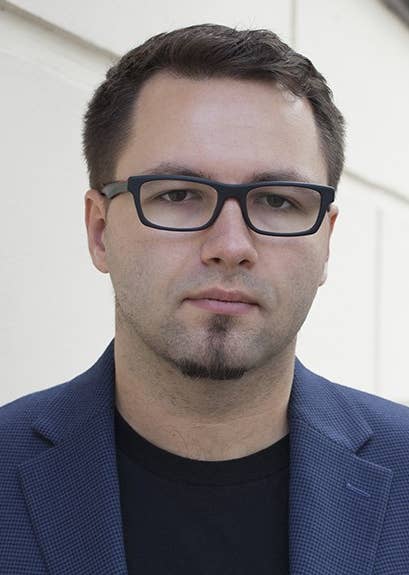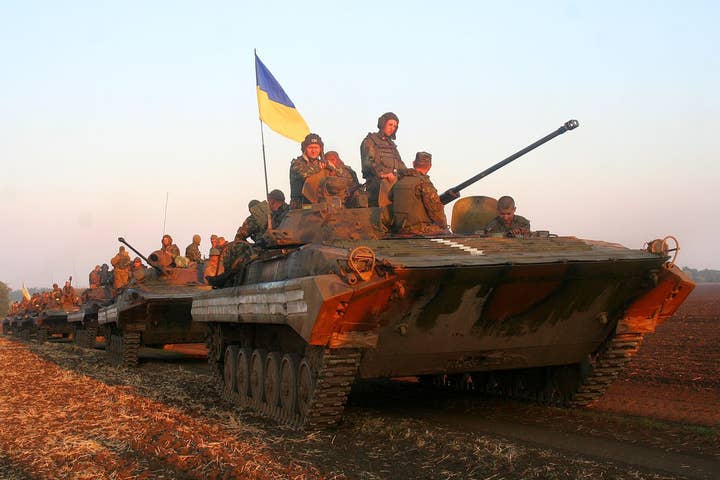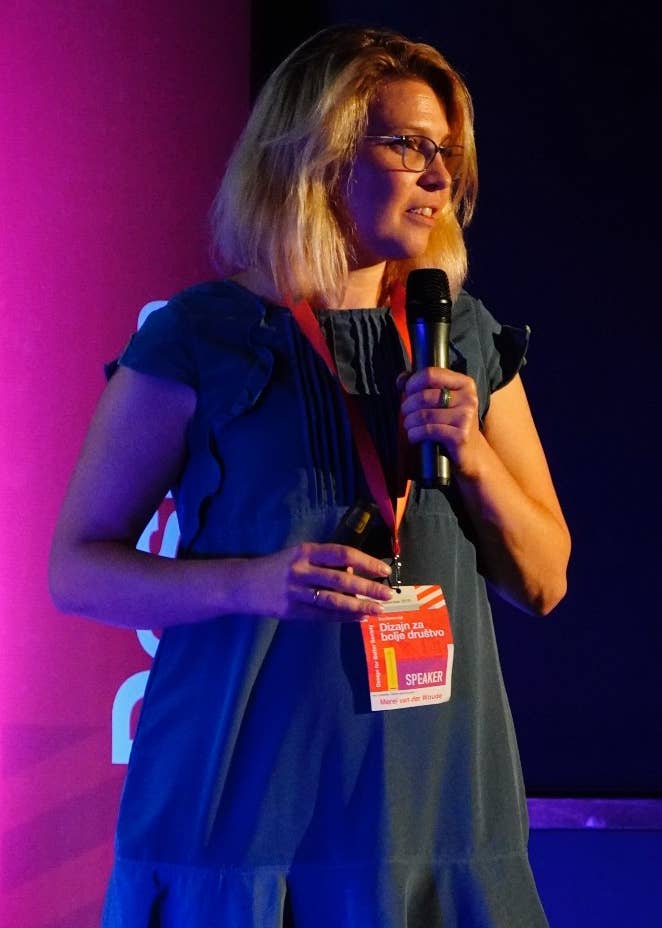How studios support their devs in wartime
From the Russian invasion of Ukraine to the civil war in Yemen to military rule in Myanmar, developers are adapting to conflict around the world
Speaking to game companies with staff in Ukraine, despite the devastation of war around them, it seems that some people just want to carry on with their work.
"When you're in a terrible situation you can't control, there's solace in doing something you can control -- which is the project you're working on," says Alex Nichiporchik, CEO at indie label TinyBuild. "Several of our directors have already seen their lives upended by conflict. My own family left everything behind in Donetsk during the Orange Revolution, and are now repeating that nightmare again in Kyiv."
Nichiporchik is originally from Latvia and lives in the Netherlands, where he oversees an international team with offices in the US and Europe. Normally, his role involves playing games, providing feedback and motivating his team. But in the wake of Russia's attacks on Ukraine, he's refocused to help his management team relocate their staff away from danger.
"Many producers have taken to crisis relocation management. The rest of the team are readjusting priorities and focusing on crucial aspects of production and publishing. It's a massive challenge to relocate dozens of people and to re-establish work/life balance."
He adds that the company is also helping its staff to leave Russia. "We will support everyone financially and logistically. They didn't choose the people responsible for these stupid decisions, and we will not abandon people."

TinyBuild isn't alone. Mobile publisher-developers Nordcurrent and Gameloft have been working to get their Ukraine-based employees to safety, while for others, relocation isn't a first option . Frogwares CEO Wael Amr told Financial Times that for them, relocation is a "last resort, since it implies a painful capitulation." The Frogwares Twitter account has posted consistent updates, explaining that the studio has and will continue to support individual staffers' decisions to enlist, flee, or continue to work. Wargaming, the studio that makes World of Tanks, is leaving Russia and Belarus.
Paris-based Gameloft established a studio in the Ukrainian city of Kharkiv in 2007, and another in Lviv five years later. Over Zoom, CFO/GM Alexandre de Rochefort repeatedly emphasizes the close ties the company has with the country and its 630 Ukranian employees.
"All of our guys there are working and they have good living conditions. Ukraine is a very developed country which was growing fast. What they needed... was the financial means to face the events," he says of Gameloft's decision to expedite February-April salary payouts instead of organizing medicine and clothing. The company also donated €600,000 to its employees -- around €1,000 per person -- to help pay for transport and hotel costs.
Gameloft's Ukranian studio managers organized transport for staff to leave Kharkiv and head west to Lviv, as well as helped arrivals in Lviv to find accommodation. However, with the surge of refugees, the number of available flats dwindled.
"We basically transformed our studio into living quarters for some of our employees and their families," de Rochefort explains. "So the meeting rooms [have been] transformed into sleeping quarters. We bought washing machines, we bought kitchen stuff to allow them to cook and basically live in our studio. So we have something very peculiar right now in Gameloft Lviv, in that people go to work there, and they have their colleagues from Kharkiv who are there as well."
"One time the city was hit by floods, we had no internet for a month. Another time, electricity was [brutally] damaged due to the air strikes"
Yousef Al-Hadhrami, Arkadia
With studios in Hungary, Romania, and Bulgaria, Gameloft has also supported its Ukranian staff who have fled to neighboring countries; de Rochefort adds that these are mostly women because of Ukranian conscription for men over 18. The team created an internal newsletter for everyone to stay informed of what the company is doing for its Ukranian staff.
"If we want to help them, it's important that we are aware of where they are... right now we have only 40 people left in Kharkiv," he says. "A lot of them have left the city, but they've gone for very different types of places, some of them have gone to the countryside... some of them have gone to Lviv, some of them have gone to Romania, some of them have gone to Poland."
Right now, Ukraine is the most visible war in the Western world's mind, prompting online outpourings of support, as well as rage against the Putin regime. In the games industry, Ukrainian solidarity has been a rallying cause for companies to divest themselves of Russian business and speak out against Russian crimes. Neighboring countries and ex-Soviet bloc states must re-face deep historical fears of unchecked Russian aggression. And while companies like Gameloft and TinyBuild have been able to help their staffers, it's been a very different story for smaller developers who have been deprived of critical Steam income thanks to sanctions and new banking restrictions that apply to Belarus, Russia, and Ukraine. To describe the situation as a catastrophe for ordinary Ukranians (and Russians and Belarusians) is a gross understatement.
But as media attention goes to the Russian war on Ukraine, there are countless others who seek to make a living in the games industry in other countries that are also beset by conflict.

In Yemen, Arkadia is the country's lone game studio, and speaking to Marwan Al-Ragehi, Yousef Al-Hadhrami and Abrar Basahi, it's clear that they want more game companies around to help their industry grow. Around 2017, the trio was part of a group of university graduates who did consulting work for Dutch social design company ButterflyWorks, which was the main contract holder for a series of mobile game projects for the Yemen branch of German international development agency GIZ (German Deutsche Gesellschaft für Internationale Zusammenarbeit).
"We basically transformed our studio into living quarters for some of our employees and their families"
Alexandre de Rochefort, Gameloft
"Basically, we were just giving them ideas, brainstorming, translation, designing as well," explains Al-Ragehi. "Then we all grouped up and thought, why not just start a gaming studio from the things we've learned... So around 2018, we started from a very small room with a table and a bunch of chairs... and from then we started growing."
Yemen has been locked in civil war since 2014 with an expected death toll of 1.3 million by 2030 if things don't change. The core conflict is between the "Ansar Allah" Houthi rebels, who control the capital Sanaa, and a Saudi-backed coalition government that has also received US military support. The UN has described the situation in Yemen as the world's "worst humanitarian disaster", with extreme famine, disease, and poverty affecting 23 million Yemenis.
Despite these overwhelming problems, the Arkadia team believes in the power of spreading positive and peaceful messages through games. Many Yemenis play Android mobile games and their early pre-Arkadia games with ButterflyWorks -- the Arabia Felix series -- generated local excitement when they first launched. Yemen's buckling infrastructure remained a huge (and ongoing) obstacle to their goals. For starters, Yemen has the slowest internet in the world (in this report, Yemen is at 0.66mbps as of December 2021, with Turkmenistan edging them out at 0.50mbps), and this is when it's working.
"There was one time that the city was hit by floods, we had no internet for a month. Another time, the internet [was] extremely slow... it takes a lot of time and effort for us," Yousef Al-Hadhrami says of simple tasks like uploading files or working on Github. "Another thing is electricity. Electricity was [brutally] damaged due to the air strikes... so now most of the people that can afford solar panels, they use those... [when] we didn't have government electricity, we had to come up with our own electricity, whether they are solar panels or black market electricity."
Discord has been banned in Yemen for the last six months, along with WhatsApp and Telegram.

Yemeni universities don't offer game-related courses, so the team had to teach themselves (and their potential hires) basic skills. After a certain point, ButterflyWorks helped to connect Arkadia to Unity. "When we bring in developers... train them to do certain tasks in a certain project, for example, it takes twice the time to teach a developer what to do, instead of doing it ourselves. And plus, doing all the tasks ourselves [takes] a long time as well," adds Al-Ragehi.
GIZ owns the rights to the games that the Yemeni team worked on. Merel van de Woude, the creative director at ButterflyWorks who worked with GIZ and the Arkadia team, believes that more NGOs and government agencies need to understand how games work -- especially when it comes to long-term maintenance -- before embarking on these projects.
"We really wanted to work with Arkadia because then they can take ownership of these games, they can keep improving them," she says. "And at the same time, they also need funding to do that... and I think the way that international development works is you have this project cycle, they have a big donor. And then at the end, when the funding is done, they go to a new project. So it's not like you have an owner of the games.... and at the same time, you're dealing with an organization that is, in the end, also executing the policy of the German government."
Van de Woude also details how difficult it was to transfer money to Yemen because of the civil war, as many banks were concerned about funding terrorism -- payments were often delayed and took a circuitous route through friends and family with overseas bank accounts.
"Honestly, the future is bleak and foggy... We fear that we've been forgotten by the rest of the world.""
The Kodots team
"We were end-responsible towards GIZ, and GIZ had a big donor from the EU who funded them," she says. "You get this sort of trickle-down hierarchical communication, where we wouldn't have been paid if we [didn't] deliver on time. [The Yemeni developers] were dealing with this situation where they were in a conflict or they weren't always online. When we made the whole budget, what they didn't realize is that their internet is really extremely costly... so at the end of the process, we had to take over some of their tasks because they weren't online. So we took some of the tasks back, which of course, is not really a nice thing, because you're doing it together."
From the experience, Van de Woude firmly believes that "co-creation" work -- working directly with locals and helping them learn new skills -- is a constructive and empowering path forward. "For them, it's not just working, not just having an income, but it's also working on a more diverse and more positive story about the country," she says, "It's not about Yemen being a country at war, it's about their whole culture, that people that live there, and that is, to me is the most important, that it doesn't become this singular story about a conflict and victims and perpetrators."
In Myanmar, Kodots Games is a tiny studio that agreed to answer questions as a collective via email, given concerns over reprisals from a violent military regime. The mostly Yangon-based team began as hobbyist devs who started by using RPG Maker.
"It all changed when our country opened up to the world after the 2011 'democratic' transition and internet access became affordable and widespread," they said. "[We] discovered a new kind of video game on the market: indie games. [Our] preconception about video game development being exclusive to entities with large capital was shattered after [we] saw indie success stories of small indie teams. 'If they can do it, so can we.'"
Myanmar is currently ruled by a military junta which executed a coup in February 2021. Even before the most recent coup in February 2021, the Tatmadaw -- the Burmese military -- has long been an oppressive force, enacting genocidal attacks against the mostly-Muslim Rohingya people, burning villages, and torturing civilians.

"Of course, the coup has affected us dramatically. In fact, IT and entertainment industries were the most immediate and heavily-affected sectors," says the Kodots team. "Internet access was the first to be heavily restricted from the very start of this coup. This alone is extremely disruptive for many, as most professionals are working from home due to Covid outbreak.
"We couldn't access essential sites like GitHub without using a VPN. Some areas in Myanmar had complete internet shut down for months. The ISPs are forced to raise the price so that the internet is not easily affordable."
The Tatmadaw is now working on a new law to outlaw VPNs which would effectively shut down the team's already-limited ability to access common development resources and 'regular' internet. Additionally, Kodots says that some areas of the country only have had six to eight hours of electricity a day for the last few months.
The fact remains that there are active wars all over the world. Israel continues to prey on Palestinians in an apartheid system, there's ongoing militia violence in Sudan (which affects neighboring Ethiopia), and civil war in Syria. These are only a few examples, and are often forgotten because they're so far removed from Western material interests or simply not part of the current media cycle.
Most of these places don't have established game companies, much less small indie studios; the most prominent Palestinian in games is a solo developer named Rasheed Abu-Eideh whose game Liyla and the Shadows of War was initially rejected by the Apple Store in 2016, and received enormous attention from 2021's itch.io bundle for Palestinian Aid. None of these developers have resources and connections to international companies to leave their homes or the platforms to receive consistent impactful support.
While Ukraine continues to combat the Russian invaders and receive extremely visible and important support both on- and offline, the games industry needs to remember that war isn't monolithic and exists in many forms outside the Western sphere. Awareness for one country's plight does not come at the expense of awareness of another.
For the Kodots team in Myanmar, watching their already-tiny dev community shrink as people leave the country, things are grim. "Honestly, the future is bleak and foggy. It's like hitting a reset button and we're back to being an isolated country again," they say. "We fear that we've been forgotten by the rest of the world."
